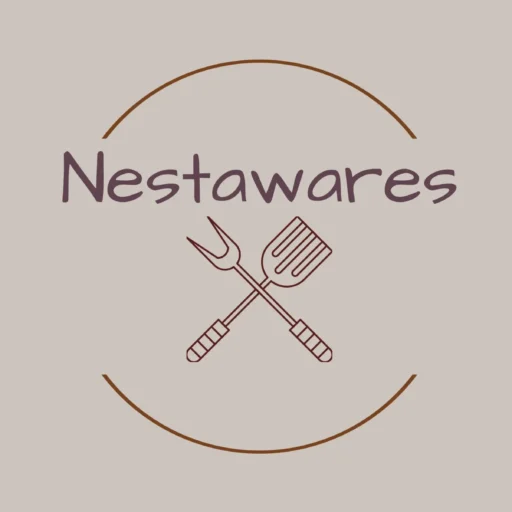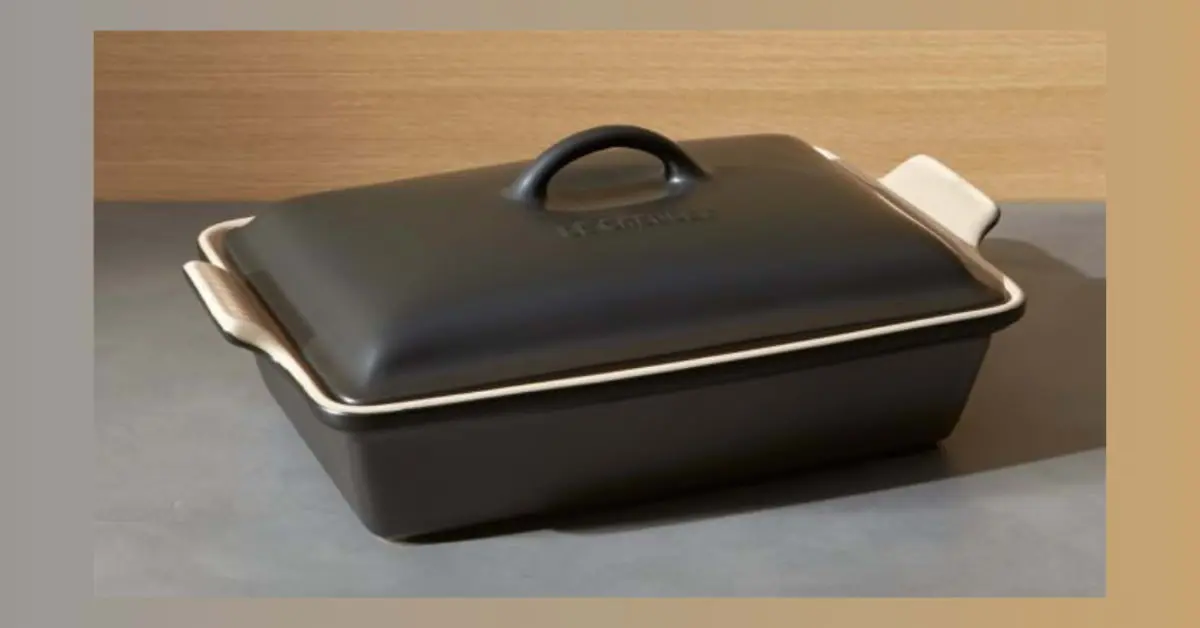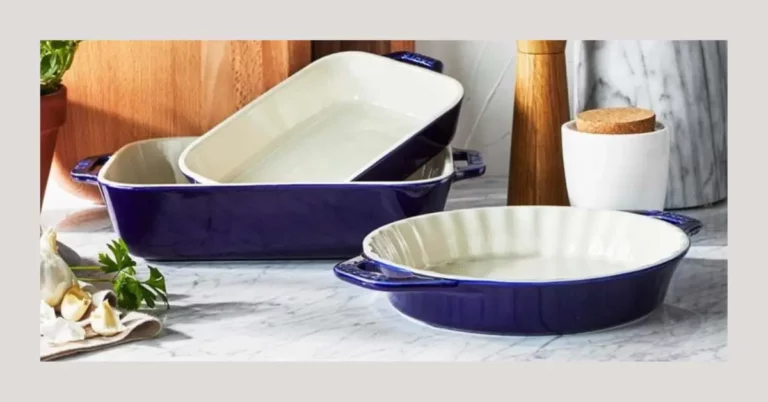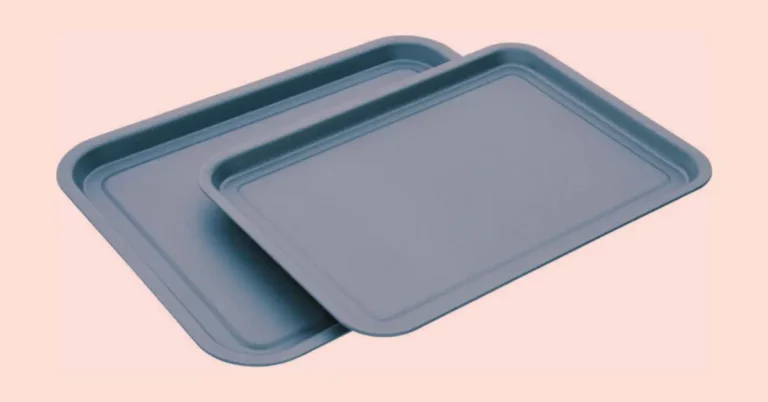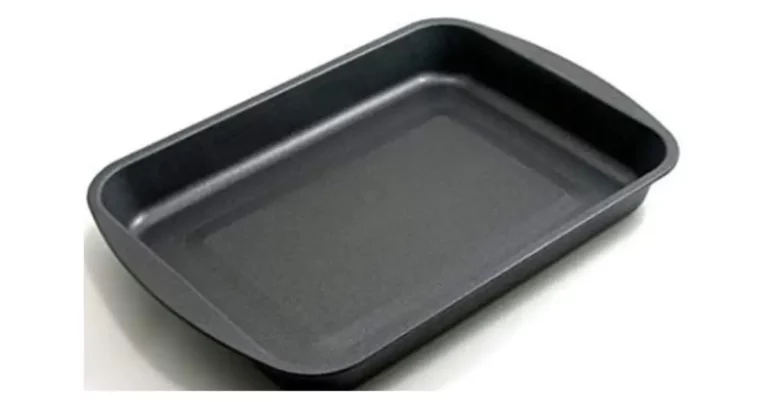Disclosure: As an Amazon associate, I may earn from qualifying purchases
This post is for those who want to know more on stoneware bakeware, and have burning questions that have piqued their curiosity. Whether you’re a seasoned baker or a kitchen enthusiast, we’re here to provide clarity on the wonders and advantages of baking with stoneware.
In this article, we will address frequently asked questions, ranging from the quality and best brands of stoneware baking dishes to comparisons with other materials and insights into professional usage.
First and foremost, you may be wondering if it’s good to bake in stoneware baking dishes. Well, you’d be surprised to know that stoneware boasts remarkable heat retention and even heat distribution, resulting in perfectly baked treats with crispy edges and tender centers.
Its natural non-stick surface allows for easy food release and simple cleanup, making it a favorite among home bakers and professionals alike.
When it comes to the best brands available, we’ve got you covered. We’ll showcase renowned brands that have mastered the art of stoneware craftsmanship, ensuring exceptional quality and durability.
While stoneware offers numerous benefits, it’s important to consider potential disadvantages. We’ll delve into factors like weight and fragility, helping you make informed decisions about incorporating stoneware into your baking routine.
By understanding the challenges, you can adapt your techniques and maximize the advantages of this exceptional material.
So, whether you’re a baking enthusiast seeking to upgrade your bakeware collection or simply curious about the wonders of stoneware, this article will serve as your go-to resource.
We’re here to answer your frequently asked questions, provide friendly advice, and foster a deeper appreciation for the joys of baking with stoneware bakeware. Let’s dive in!
In this article, we will address frequently asked questions, ranging from the quality and best brands of stoneware baking dishes to comparisons with other materials and insights into professional usage.
First and foremost, you may be wondering if it’s good to bake in stoneware baking dishes. Well, you’d be surprised to know that stoneware boasts remarkable heat retention and even heat distribution, resulting in perfectly baked treats with crispy edges and tender centers.
Its natural non-stick surface allows for easy food release and simple cleanup, making it a favorite among home bakers and professionals alike.
When it comes to the best brands available, we’ve got you covered. We’ll showcase renowned brands that have mastered the art of stoneware craftsmanship, ensuring exceptional quality and durability.
While stoneware offers numerous benefits, it’s important to consider potential disadvantages. We’ll delve into factors like weight and fragility, helping you make informed decisions about incorporating stoneware into your baking routine.
By understanding the challenges, you can adapt your techniques and maximize the advantages of this exceptional material.
So, whether you’re a baking enthusiast seeking to upgrade your bakeware collection or simply curious about the wonders of stoneware, this article will serve as your go-to resource.
We’re here to answer your frequently asked questions, provide friendly advice, and foster a deeper appreciation for the joys of baking with stoneware bakeware. Let’s dive in!
Frequently Asked Questions
What is the best stoneware bakeware?
There are several good stoneware bakeware brands available, and the “best” one can depend on personal preference and needs. Here are some popular ones:
When choosing the best utensils for your needs, consider factors such as size, durability, ease of use and cleaning, and personal style preferences.
- Le Creuset – known for their high-quality and durable bakeware made from stone, but can be quite expensive.
- Emile Henry – another top brand that produces superior, colorful stone-based kitchenware that is resistant to chipping and cracking.
- Rachael Ray – affordable clay cookware that comes in a variety of colors and designs.
- Staub – known for their cast iron cookware, but also produces durable and functional rustic bakeware.
- Fiesta – offers colorful kitchenware that is microwave, oven, and dishwasher safe.
When choosing the best utensils for your needs, consider factors such as size, durability, ease of use and cleaning, and personal style preferences.
Is it better to bake in stoneware?
Baking in stoneware can have several benefits over other types of bakeware. They are known for their ability to distribute heat evenly, which can result in more evenly baked goods.
They are also great at retaining heat, which can help keep food warm for longer periods after it has been removed from the oven.
Bakeware built from stone is generally very durable and can withstand high temperatures, making it a great choice for baking dishes that require high heat.
On the other hand, earthenware can be heavier than other types of bakeware and may require some extra care when cleaning to avoid damage or chipping.
They are also great at retaining heat, which can help keep food warm for longer periods after it has been removed from the oven.
Bakeware built from stone is generally very durable and can withstand high temperatures, making it a great choice for baking dishes that require high heat.
On the other hand, earthenware can be heavier than other types of bakeware and may require some extra care when cleaning to avoid damage or chipping.
Is Le Creuset stoneware good quality?
Yes, Le Creuset stoneware is considered to be of very high quality. Le Creuset is a premium cookware brand that is known for producing high-end, durable, and long-lasting cookware products that are designed to withstand the rigors of everyday use.
Le Creuset is made from high-fired stone that is resistant to chipping, cracking, and scratching, and is also safe for use in the oven, microwave, freezer, and dishwasher.
The brand also offers a wide range of colors and styles, so you can choose a piece that complements your kitchen decor.
While Le Creuset can be more expensive than other brands, many people believe that the quality and durability of their products are worth the investment.
Le Creuset is made from high-fired stone that is resistant to chipping, cracking, and scratching, and is also safe for use in the oven, microwave, freezer, and dishwasher.
The brand also offers a wide range of colors and styles, so you can choose a piece that complements your kitchen decor.
While Le Creuset can be more expensive than other brands, many people believe that the quality and durability of their products are worth the investment.
What is the best brand in casserole?
There are several great brands for casseroles, and the “best” brand can depend on your personal requirements.
When choosing the best casserole brand for your needs, consider factors such as size, material, ease of use and cleaning, and personal style preferences.
- Le Creuset – known for their excellent, robust, and beautiful enameled cast iron and stone casseroles that can be used for both cooking and serving.
- Staub – another premium brand that produces cast iron casseroles with enamel finishes that are designed to last a lifetime.
- Emile Henry – offers a variety of first-rate, colorful ceramic casseroles that are chip and scratch-resistant and can be used in the oven, microwave, and freezer.
- Pyrex – a more affordable brand that produces glass casseroles that are versatile, easy to clean, and can be used for cooking, serving, and storing food.
- Cuisinart – offers a range of casserole dishes made from stainless steel, cast iron, and ceramic that are durable, versatile, and suitable for a variety of cooking styles.
When choosing the best casserole brand for your needs, consider factors such as size, material, ease of use and cleaning, and personal style preferences.
What bakeware do professionals use?
Professional bakers and chefs typically use a variety of bakeware types and brands depending on the recipe and desired outcome. However, some popular bakeware types and brands used by professionals include:
Heavy-duty aluminum sheet pans – These are versatile and tough, and can be used for a variety of baking tasks, such as making cookies, pastries, and sheet cakes.
Silicone baking mats – These non-stick mats are great for preventing baked goods from sticking to the pan and can be used for baking cookies, pastries, and more.
Stainless steel baking sheets – These can withstand high temperatures and are often used for baking bread and pizza.
Cast iron skillets and Dutch ovens – These multifunctional pieces of bakeware can be used for a variety of tasks, from baking bread to making casseroles and stews.
Brands such as Vollrath, Chicago Metallic, and Fat Daddio’s are also popular among professional bakers and chefs.
Professionals tend to prefer bakeware that is top-notch and adaptable, allowing them to achieve consistent and reliable results in their baking and cooking.
Professionals tend to prefer bakeware that is top-notch and adaptable, allowing them to achieve consistent and reliable results in their baking and cooking.
What is better stoneware or ceramic?
- Material: Stoneware is made from a type of clay that is fired at a high temperature, which makes it denser and more durable than ceramic. Ceramic, on the other hand, is made from various clay mixtures and fired at a lower temperature, which makes it less dense and more porous than stoneware.
- Heat Distribution: Stoneware is great at distributing heat evenly, which can result in more evenly baked goods. Ceramic is also good at heat distribution, but may not be as effective as stoneware.
- Durability: Stoneware is generally more sturdy and resistant to chipping, cracking, and scratching than ceramic. Ceramic can be more delicate and may require more careful handling.
- Style and Design: Ceramic is often used for decorative purposes and can come in a wider range of colors, patterns, and designs than stoneware.
Both of these are great choices for baking and cooking. If you’re looking for strength and even heat distribution, the former may be the better option. If you’re looking for more design options or a more delicate material, ceramic may be the better option.
What are the disadvantages of stoneware?
- Weight: Stoneware is generally heavier than other types of bakeware, which can make it more difficult to handle and manoeuvre, especially for those with physical limitations.
- Porosity: Kiln-fired cooking utensils are porous, which means that they can absorb liquids and odors from the food it comes into contact with.
This can make them more difficult to clean and may also affect the flavor of subsequent baked goods. - Potential for cracking: They can be more prone to cracking or chipping than other types of bakeware, especially if it’s subjected to sudden changes in temperature, such as going from the oven to a cold countertop.
- Longer preheating time: Because ceramic vessels are denser and heavier than other types of bakeware, it may take longer to preheat, which can add to the overall cooking time.
- Cost: These can be more expensive than other types of bakeware, especially if you opt for high-end brands like Le Creuset or Staub.
Many of these disadvantages can be mitigated by proper care and use, such as allowing them to cool slowly and avoiding sudden temperature changes.
Also using non-abrasive cleaners, and handling it carefully can make a significant difference.
Is stoneware better than bone china?
Stoneware and bone china are both great materials for different purposes.
Stoneware is a type of clay that is fired at a high temperature, which makes it heavy and robust. It is a great choice for baking and cooking, as it distributes heat evenly and can withstand high temperatures without cracking.
They are also often used for serving dishes because of its attractive appearance and durability.
Bone china, on the other hand, is a type of porcelain that is made from a mixture of clay, feldspar, and bone ash. It is lightweight, translucent, and has a delicate appearance, making it a popular choice for formal dining settings.
Bone china is also durable, but it is not as strong as kiln-fired utensils and can chip or crack more easily.
The choice between the both comes down to intended use. If you are looking for strong and multi-purpose cookware, stoneware may be the better option.
If you are looking for elegant dinnerware for formal occasions, bone china may be the better option.
Stoneware is a type of clay that is fired at a high temperature, which makes it heavy and robust. It is a great choice for baking and cooking, as it distributes heat evenly and can withstand high temperatures without cracking.
They are also often used for serving dishes because of its attractive appearance and durability.
Bone china, on the other hand, is a type of porcelain that is made from a mixture of clay, feldspar, and bone ash. It is lightweight, translucent, and has a delicate appearance, making it a popular choice for formal dining settings.
Bone china is also durable, but it is not as strong as kiln-fired utensils and can chip or crack more easily.
The choice between the both comes down to intended use. If you are looking for strong and multi-purpose cookware, stoneware may be the better option.
If you are looking for elegant dinnerware for formal occasions, bone china may be the better option.
Is porcelain stoneware better than stoneware?
Porcelain and stoneware are both great materials for different purposes, and which one is “better” depends on your needs.
Porcelain is a type of stone that is made from a specific mixture of clay and other materials that is fired at a high temperature. It is rugged, long-lasting and has a non-porous surface, which makes it resistant to staining and absorption of liquids.
They are also often used for flooring, wall tiles, and countertops, but it can also be used for baking and cooking.
Stoneware, on the other hand, is made from a different type of clay that is fired at a high temperature. It is also tough and lasting, and it is a great choice for baking and cooking, as it distributes heat evenly and can withstand high temperatures without cracking.
If you are looking multi-purpose cookware, stoneware may be the better option. If you are looking for a material that is resistant to staining and can be used for flooring, wall tiles, and countertops, porcelain may be the better option.
Porcelain is a type of stone that is made from a specific mixture of clay and other materials that is fired at a high temperature. It is rugged, long-lasting and has a non-porous surface, which makes it resistant to staining and absorption of liquids.
They are also often used for flooring, wall tiles, and countertops, but it can also be used for baking and cooking.
Stoneware, on the other hand, is made from a different type of clay that is fired at a high temperature. It is also tough and lasting, and it is a great choice for baking and cooking, as it distributes heat evenly and can withstand high temperatures without cracking.
If you are looking multi-purpose cookware, stoneware may be the better option. If you are looking for a material that is resistant to staining and can be used for flooring, wall tiles, and countertops, porcelain may be the better option.
Is Pampered Chef stoneware worth it?
Pampered Chef is a popular brand of stoneware that is known for its quality and resilience. Their dishes are made from a high-quality clay mixture and is fired at a high temperature, which makes it so tough.
One of the main advantages of Pampered Chef is its ability to distribute heat evenly, which can help to ensure that your baked goods are cooked evenly and come out perfectly every time.
They are also known for their ability to retain heat, which can help to keep your food warm for longer periods of time.
While these can be more expensive than some other brands, many people believe that it is worth the investment due to its sheer quality. They also offer a warranty on their products, which can provide additional peace of mind.
One of the main advantages of Pampered Chef is its ability to distribute heat evenly, which can help to ensure that your baked goods are cooked evenly and come out perfectly every time.
They are also known for their ability to retain heat, which can help to keep your food warm for longer periods of time.
While these can be more expensive than some other brands, many people believe that it is worth the investment due to its sheer quality. They also offer a warranty on their products, which can provide additional peace of mind.
What are the benefits of Pampered Chef stoneware?
- Even heating: Pampered Chef stoneware distributes heat evenly, which can help to ensure that your food cooks evenly and comes out perfectly every time.
- Retains heat: They retain heat well, which means that your food will stay warm for longer periods of time.
- Versatility: They can be used for a wide range of cooking and baking tasks, from roasting meat and vegetables to baking cakes and breads.
- Non-stick: They have a naturally non-stick surface, which means that you don’t need to use as much oil or butter when cooking or baking.
- Easy to clean: They are easy to clean and requires only a quick rinse with hot water and a scraper to remove any residue. It is also dishwasher safe.
- Durable: They are made from high-quality clay that is fired at a high temperature, which makes it durable and resistant to chipping and cracking.
- Warranty: They come with a warranty, which can provide peace of mind and protect your investment.
What bakeware does Gordon Ramsay use?
Gordon Ramsay, the celebrity chef, is known for using a wide range of cookware and bakeware in his professional and personal kitchens.
While it’s not clear exactly what specific bakeware he uses, he has recommended several premium brands in the past, including:
While these brands may be higher-end and more expensive, there are many other options available that can provide excellent results at a more affordable price point. Ultimately, the best bakeware for you will depend on your specific needs, preferences, and budget.
While it’s not clear exactly what specific bakeware he uses, he has recommended several premium brands in the past, including:
- Le Creuset: Ramsay has been known to use Le Creuset stoneware for baking and roasting.
- Emile Henry: Ramsay has also recommended Emile Henry bakeware for its durability and even heat distribution.
- Mauviel: Ramsay has used Mauviel copper bakeware in his professional kitchens, which is known for its excellent heat conductivity and durability.
- Matfer Bourgeat: Ramsay has also used Matfer Bourgeat bakeware, a professional-grade brand known for its high quality and strength.
While these brands may be higher-end and more expensive, there are many other options available that can provide excellent results at a more affordable price point. Ultimately, the best bakeware for you will depend on your specific needs, preferences, and budget.
